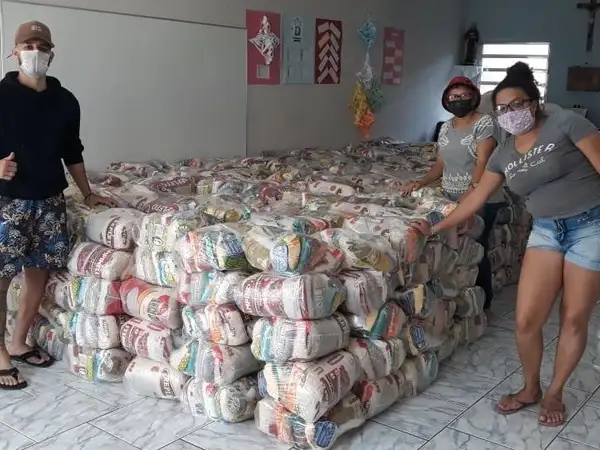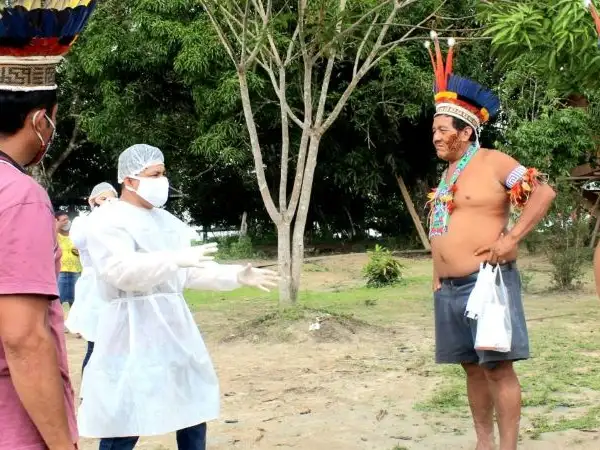

Volunteers get ready to give out food to families in São Paulo, Brazil.
Brazil is the largest country in Latin America, rich in diversity and natural resources.
However, it is also one of the most unequal nations in the world and over 50 million Brazilians live in poverty. In recent years, the Brazilian government has made drastic cuts to health, education and housing that are affecting the poorest most of all.
Now, legal protection of human rights and the environment are being further undone while Brazil suffers from the coronavirus crisis. The second wave of Covid-19 cases is now outstripping the first wave. So far, there have been almost 8.5 million confirmed cases and over 500,000 deaths.
What was the situation in Brazil before coronavirus hit?
Housing and rights to land are key issues in Brazil for the poor and indigenous communities we work with.
In urban favelas and shanty-towns, we have worked for many years with the local Church, community leaders and volunteers to fight for the right to safe homes for families. Having an address means you can get a regular job, send your children to school and access other government support.
In the Amazon, small-scale farmers and indigenous communities are at risk of losing their land. Mining, logging, cattle-ranching and soya production companies constantly invade protected rainforest and there are often violent clashes against the local population.
There was already a healthcare emergency happening before coronavirus hit. Like elsewhere in Latin America, access to good healthcare in Brazil is based on wealth. Hospitals can be days away for indigenous communities, and visiting them can also be dangerous for this group, who often lack resistance to many common diseases.
What is the current situation with the new ‘Amazonian’ variant?
Since the beginning of this year, the State of Amazonas has declared a public emergency due to the collapse of public hospitals, owing to the lack of hospital supplies, mainly oxygen, which has caused the death of hundreds of people.
The situation is no different in the neighbouring states of Amazonas. In Roraima, there has been a 200 per cent increase in cases and deaths. The coronavirus variant, called the "Amazonian variant", is present in 50 per cent of confirmed cases. Three cases of this variant have already been confirmed in São Paulo.
Is oxygen now reaching public hospitals?
At dawn on Tuesday 26 January, oxygen cylinders finally arrived in Manaus, after numerous delays.
After being procured by the National Conference of Bishops of Brazil (CNBB) and Caritas, it was possible to bring "breath of life" to dozens of people in the Amazonas – and the oxygen was distributed immediately to different municipalities.
Local Caritas volunteers and health workers have been linked to health institutions and are in the process coordinating further distributions. They are urgently working to distribute other vital items such as water, disposable masks and gloves, medicines, and mattresses.
CNBB President Dom Walmor Azevedo said: “the situation experienced in the city of Manaus is an urgent call for Christians and for all people sensitive to the suffering of others. You need to help.”
Are people receiving vaccinations in Brazil?
The health institute Fiocruz says only 11 per cent of adults are fully vaccinated.
According to the National Vaccination Plan, there will be four priority groups in Brazil, totalling 50 million people. However, to date, Brazil has only secured one-third of the doses needed for these priority groups.
In Manaus, vaccinations began on Monday 18 January after the government of São Paulo sent 50,000 doses of the vaccine. Another 256,000 doses were sent by the Ministry of Health. However, the Manaus Vaccination Programme has since been suspended by the court due to allegations of fraud.
How has the Church responded in Brazil?
At the start of the new year, The National Conference of Bishops of Brazil (CNBB) made a statement saying: “The 'new' that we are looking for in 2021 requires the union of all citizens, to come together in good will, in face the COVID-19. A pandemic cannot be beaten in isolation. To eradicate COVID-19, it is essential that everyone walk together, in solidarity.
“It is necessary to recognize that the virus does not respect borders, social classes, and any other form of categorization that, so often, justify regrettable discrimination. Justice, solidarity, and inclusion are the main criteria to be followed in facing this pandemic.
“The figures show that the pandemic is becoming more serious in Brazil. There are already about 200,000 dead. These lost lives cannot simply compose statistical tables. It is mourning and pain in the hearts of families. These are stories interrupted by an agile, dangerous, and invisible, yet real, threat.
“Brazilian society demands prompt union and action by government officials, in different spheres of power, guided by science and serious indications from epidemiologists, so that vaccination begins urgently, because, every day, lives are lost to the pandemic, and economic and social impacts worsen."
“The vaccine [must be] for everyone. Special attention must be paid to the most vulnerable and poor. It is unacceptable and unwise for the vaccine to reach some more quickly, leaving most of the population uncovered.
“Pope Francis, in his Encyclical Letter Fratelli Tutti, teaches that the word solidarity expresses much more than sporadic gestures. “Solidarity, in its deepest sense, is a way of making history” (Encyclical Letter Fratelli Tutti, n. 116).
“Humanity is sick with the pandemic and will only find a cure if it walks together. God, who made us free and co-responsible for the work of Creation, for the care of one another, help us to learn from the lessons of this pandemic, so that we can overcome it and move forward in building a healthier world, starting from fraternity and universal solidarity.”
How has the Brazilian government responded to coronavirus?
The President of Brazil has ignored quarantine measures enforced by many state governments and new laws have been brought in to encourage businesses to go and exploit the Amazon. In April of last year, there was almost twice as much environmental destruction and logging in the Amazon as there was in April 2019.
Local lockdowns are in place, but these measures to prevent the spread of coronavirus present a real challenge to poor families, who need to work in order to eat.
What challenges are there to surviving lockdown and fighting coronavirus?
Many people from the countryside have travelled to the capital as they lack medical resources in rural clinics. When they arrive, however, they have found that healthcare facilities in Manaus are already at capacity.
The capital was already catering for the emergency needs and offering medical care to indigenous communities and Venezuelan migrants. Due to movement restrictions caused by Covid-19, many indigenous people have been forced to stay in the homes of relatives with no financial means to support themselves. This influx of people from the countryside has put even more strain on already stretched resources.
It’s a difficult time because I don’t have a fixed income. During the pandemic, I haven’t received any orders. So the food basket came at a good time and it helped me a lot.
The situation in the Amazon is critical. The survival of many cultures and communities is under threat. There are only hundreds of thousands of indigenous people in Brazil but the infection rate among their communities is far higher than the general population. Past epidemics have shown how devastating respiratory illnesses can be for these groups.
How has CAFOD responded to coronavirus in Brazil?
In São Paulo and other cities we've been helping to give out essential food, facemasks and hygiene kits for vulnerable families living in favelas and shanty-towns. Our local experts in the community have negotiated with local authorities so that they can send volunteers to deliver food to families in need and help them survive the lockdown. We’ve also given advice to these volunteers on social distancing, to keep them safe.
In the Amazon and in north-east Brazil, the local Church and community organisations have been supporting farmers to get their food to families on the edges of cities, so that urban families don't go hungry.


Delivering food and hygiene kits to indigenous communities.
With the indigenous Amazon communities, we have provided:
food supplies
prevention information in local languages
personal protective equipment (PPE).
We are also monitoring coronavirus cases and working with health officials to get people tested and treated where possible in their communities, reducing travel to a central hospital where risk of infection is high.

